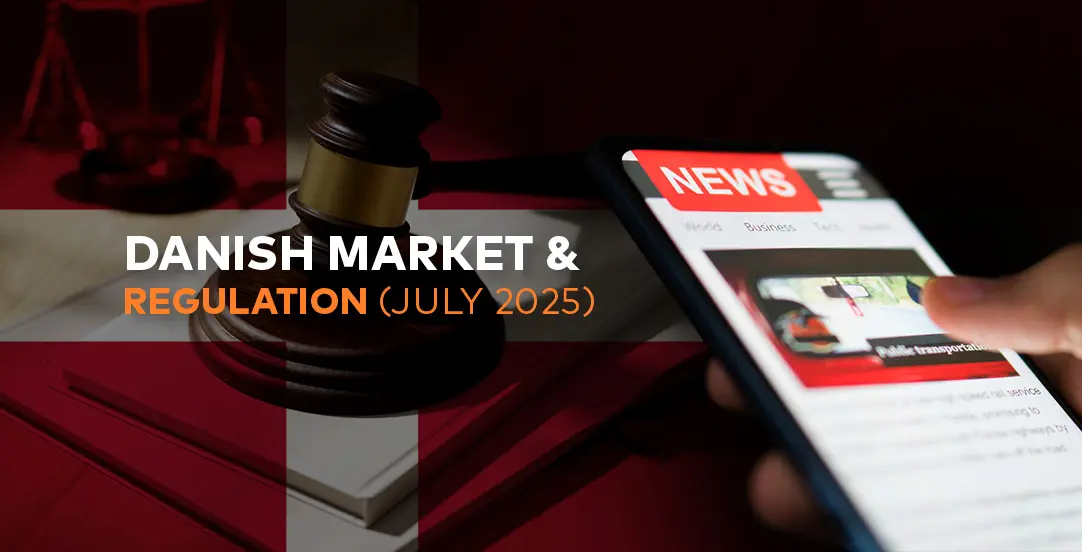Danish regulatory and market developments July 2025 impact

Danish regulatory and market developments July 2025 serve as a window into both the resilience and transformation of one of Europe’s most closely watched iGaming markets. In the midst of swift technological innovation, changing consumer habits, and a tightening regulatory landscape, Denmark’s gambling scene has entered a vital new phase. This article unpacks the latest data, market movements, and regulatory updates, offering the context that explains why Denmark is often considered a bellwether for the broader European gaming industry.
Online casino drives record-breaking revenue in Denmark
The numbers speak for themselves. In May, Denmark’s total gambling revenue climbed to DKK 683 million (about $107 million), according to Spillemyndigheden, the national regulator. This reflects a 19.6% year-on-year surge, with online casino activity taking center stage. Slots alone contributed a remarkable DKK 323.4 million, comprising 83% of total online casino revenue for the month. Mobile gaming continues to dominate, responsible for 66.43% of all online stakes—reinforcing the “mobile-first” reality that defines today’s player expectations.
The spike is more than just a single-month anomaly. Since the beginning of 2024, iGaming gross gaming revenue (GGR) has demonstrated an accelerating upward trajectory. In May, year-on-year development stood at 40%, smashing the previous high-water mark set in June last year. This kind of momentum signals deep-rooted shifts in how Danes play—and what they expect from digital entertainment.
Land-based venues hold steady amid digital disruption
While digital channels thrive, the story unfolds differently for Denmark’s land-based gambling sector. Land-based casinos reported a slight, 4.7% decline compared to May the previous year, yet slot machines outside casinos saw a monthly rebound, drawing DKK 105 million—an 8.3% increase over 2024. Most of these gains came from gaming halls, while restaurant-based machines continued their steady role. The land-based casino revenue remained level at DKK 32 million.
This blend of digital acceleration and physical stability shows how the Danish market manages not just to weather digital disruption, but also to integrate new trends with longstanding consumer habits. Retail betting, while now smaller in comparison to its online counterpart, still plays a meaningful role in the local ecosystem.
Regulatory clarity and consumer protection take the spotlight
This summer marked a pivotal moment in Danish gambling regulation. The Danish Gambling Authority (DGA) released significant updates to the guidelines governing marketing and sales promotions. For operators, this means a new era of transparency and accountability. The newly issued versions clarify how advertising must represent winning chances, ensure that gambling is always framed as entertainment—and not as a shortcut to wealth or social status—and strictly prohibit content targeting minors.
Promotional mechanics have been redefined. Playthrough requirements for bonuses are now capped at 10 times the initial stake, promotional offers must be available to at least 100 players, and operators must present all terms and conditions clearly, even in space-limited ad formats. The restrictions extend to the use of the term “free” in promotions—now banned unless there truly are no strings attached. Perhaps most notably, operators are required to check the ROFUS self-exclusion register prior to sending any marketing materials. This builds a further layer of consumer protection into an already robust framework.
Expanded requirements for disclosure in all marketing formats
The new guidance extends to all platforms: SMS, podcast sponsorships, banners, and social media profiles must all disclose minimum age requirements, details on ROFUS, and information regarding the StopSpillet responsible gambling helpline. The DGA demands not only legibility but also proximity—all critical terms have to be placed close to the promotional offer, preventing operators from hiding behind hyperlinks or small print. This approach signals Denmark’s ongoing determination to lead on transparency and player protection within the European context.
Industry partnerships and local engagement reach new heights
As regulation evolves, so too does the market’s approach to partnerships and sponsorships. Several notable deals have recently reshaped the landscape. Betano, operated by Kaizen Gaming, has secured the title of official betting partner for the 3F Superliga, the top tier of Danish football, beginning with the 2025/26 season. This agreement builds on Betano’s presence through existing club partnerships and brings branding and visibility rights at the league level. The company’s commitment to responsible gaming was singled out by league executives as a positive force for Danish football’s growth.
Meanwhile, ComeOn Group has expanded its “ComeOn! Moments” initiative by partnering with AC Horsens, HB Køge, and newly promoted FC Fredericia. These partnerships go beyond shirt sponsorship, aiming to weave clubs more closely into their communities through campaigns that merge the excitement of live sports with innovative betting technology. ComeOn’s strategy is clear: connect fans, athletes, and local stories to foster deeper engagement and responsible play.
LeoVegas launches proprietary sportsbook platform
On the technology front, LeoVegas made headlines with the debut of its proprietary sportsbook in Denmark. Following recent leadership changes and a phase of international expansion, the move signals an ambition to blend personalized experiences with innovative technology. The engineering effort invested in the Danish launch sets the pace for further rollouts in additional markets, reflecting a push to offer a world-class, localized betting experience. Notably, LeoVegas’s partnership with Kambi for Odds Feed+ remains in place, providing enhanced data integration into its new platform.
Player protection remains a central focus
Alongside commercial and technological developments, Denmark’s responsible gambling frameworks are stepping up. The self-exclusion program, ROFUS, surpassed 62,000 registrants by May, underscoring both the scale of gambling activity and the country’s commitment to player safeguards. The majority of those registered are men (78.5%), and most have chosen permanent exclusion. Additionally, usage data from the StopSpillet helpline points to young men aged 18–25 as the demographic most at risk, aligning with findings in other major markets like the UK.
Operators are tightly bound to these systems—not only in marketing compliance but also in proactive player engagement. The combination of high-tech platforms, more transparent marketing, and robust exclusion programs is shaping a market environment that prizes both growth and responsibility.
Denmark as an iGaming trendsetter
What sets Denmark apart is not a single innovation or regulatory decree, but the dynamic way in which these elements interact. While some European markets struggle to balance growth with consumer protection, Denmark has shown that both are achievable when regulators, operators, and industry partners work in concert.
Looking ahead, the Danish model will likely continue to influence regulatory thinking across Europe. By advancing transparency, championing responsible engagement, and adopting cutting-edge technology, Denmark remains at the vanguard of iGaming’s evolution. The rapid ascent in online gaming revenue, groundbreaking new partnerships, and firm regulatory hand have set a gold standard for digital gambling environments.





















